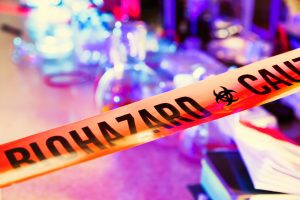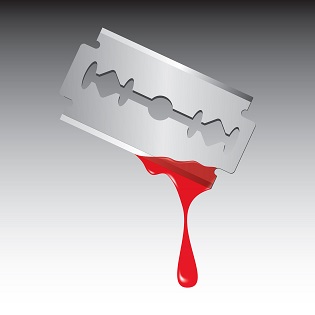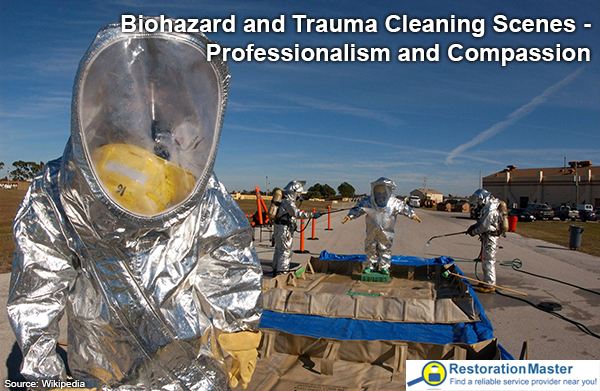The Health Effects of Cleaning Up Biohazard Materials
Suicide, murder, crime and trauma scenes require cleanup by biohazard cleaning professionals. The blood, bodily fluids, bone fragments, and bodily tissue involved can transmit harmful pathogensPathogens are microorganisms such as bacteria, viruses, or f... More to those who come into contact with these biohazard materialsBiohazard materials are substances that pose a risk to human... More.
Biohazard Cleaners Vs. General Cleaners
Due to the high risk of serious illnesses contracted by anyone who handles the biohazard waste, cleanup should only be performed by certified biohazard cleaning professionals. Hiring a general cleaning contractor, as a more cost-efficient method, rather than a biohazard cleaning team can leadLead is a heavy metal that can be toxic to humans, especiall... More to improper cleaning techniques. As a result, the property owner will be saddled with a huge bill to remediate the ineffective cleaning procedures; falling sick is a risk that accompanies the mishandling of biohazard materialsBiohazard materials are substances that pose a risk to human... More by cleaners who are not licensed to treat biohazard scenes.
Take the example of a homeowner whose garage required decontamination and cleaning after 600 pounds of deer meat rotted after a power outage. In this instance, a general cleaning company was called in—rather than a biohazard cleaning company. The cleaning company failed to seal the concrete surfaces and perform other necessary biohazard cleaning practices, which led to the unbearable stench of the rotting carcass wafting throughout the entire home. Occupants in the home became ill. After an investigation, the insurance company was sued for the value of a new home.
Biohazard cleaning is not for the faint of heart—or for the inefficiently trained. Improper cleaning can leadLead is a heavy metal that can be toxic to humans, especiall... More to a variety of diseases, some treatable and some incurable. Bacterial illnesses are carried in blood, feces and bodily fluids. PathogensPathogens are microorganisms such as bacteria, viruses, or f... More can live in these biohazard materialsBiohazard materials are substances that pose a risk to human... More for up to 16 days after death, especially if the temperatures and environment are conducive to their survival.
Bloodborne Pathogens Lead to Illness
Biohazard cleanup can be fatal if handled improperly. HIV, Hepatitis B, and Hepatitis C can be transmitted from mere contact with bodily fluids. Some of these diseases are incurable and are contracted from contact with the deceased’s blood or other infected bodily fluids:
HIV AIDS is the Human Immunodeficiency Virus and the Acquired Immunodeficiency Syndrome. HIV has no cure. The virus unleashes a deadly attack on the body’s immune system, which causes the disease known as AIDS. HIV can be transmitted through infected blood and bodily fluids, such as saliva, semen, vaginal fluids and tears.
Hepatitis B is caused by the Hepatitis B Virus (HBV), a bloodborne pathogen that can be fatal to the carrier. HBV infections are transmitted through exposure to blood as well as infected bodily fluids.
Like Hepatitis B Virus, the Hepatitis C Virus (HCV) is a life-threatening bloodborne pathogen. Those with Hepatitis C experience chronic infections and liver disease. Vaccines for HCV are unavailable.
Hepatitis A is caused by the Hepatitis A Virus (HAV) and can be found in the feces of infected individuals. Contact with the stools of an infected person can leadLead is a heavy metal that can be toxic to humans, especiall... More to transmission of the virus.
All it takes is one drop of blood splashed onto the face of a good Samaritan or other nonprofessional cleaning up the biohazard scene to contract a deadly disease. Exposure can be in the form of direct contact with skin that is non-intact, injuries from bone fragments, inhalation, and splashes of bodily fluids or blood to the face, including nose, mouth or eyes.
Regulations Prevent the Spread of Disease
Since blood and bodily materials are frequently found in crime and trauma scenes, it is crucial that cleaners abide by all regulations to avoid risks to their health. OSHA compliance regulations protect the biohazard cleanup crew from liability and prevent injury. Restoration companies must meet not only the OSHA Bloodborne PathogensPathogens are microorganisms such as bacteria, viruses, or f... More Standard, but several more, including Hazard Communication, Personal Protective Equipment, and Heat Illness.
All biohazard waste must be disposed of properly to prevent the spread of disease. The Environmental Protection Agency’s as well as local, state, and federal regulations must be followed to ensure the safety of the general public. Some biohazard companies are licensed to transport and store biohazard waste, while others are not. Improper waste handling can incur major fines to the biohazard cleaning company.
Due to the inherent dangers of cleaning up a biohazard scene, remediation specialists are thoroughly trained. Professionals in biohazard cleaning follow strict safety regulations and stringent decontamination procedures. General cleaning companies simply do not have the training to handle biohazard waste and cleaning.
Property Damage from Biohazards
Professional biohazard cleaning companies are aware of the health dangers that lurk beyond the visible blood, bodily fluids, and bodily tissue. Blood can seep in between the floorboards, through the grout, and make its way to the subflooring. This could leadLead is a heavy metal that can be toxic to humans, especiall... More to an infestation of disease causing pathogensPathogens are microorganisms such as bacteria, viruses, or f... More, unbearable odors and damaged structures. New flooring may have to be installed after the contaminated floorboards are removed. Biohazard cleaners are skilled in cleaning up the bodily contaminants as well as the surrounding environment.












